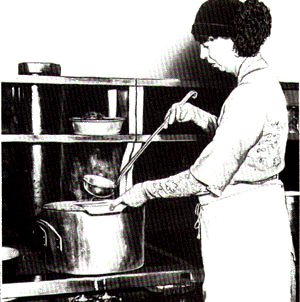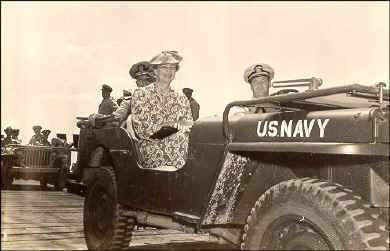Humanitarian
Efforts
"Where, after all, do
human rights begin? In small places, close to home; in the
everyday world of human beings--the neighborhoods they live in,
the schools or colleges they attend, the factories, farms or
offices where they work, where every man, woman, and child seeks
to have equal justice and opportunity, equal dignity without
discrimination. Unless these rights have meaning there, they have
little meaning anywhere. Without concerned citizen action to
uphold them close to home, we shall look in vain for progress in
the larger world." -Adapted from a speech by Mrs.
Roosevelt in 1958 at the United Nations
 From the very beginning of her life,
Eleanor Roosevelt was a humanitarian. At eighteen, she joined the
Junior League, a group of women involved in social work, and
taught at Rivington Street Settlement House8. She approached everything with
exuberance and chose to give not only her money but also her
time. She taught
From the very beginning of her life,
Eleanor Roosevelt was a humanitarian. At eighteen, she joined the
Junior League, a group of women involved in social work, and
taught at Rivington Street Settlement House8. She approached everything with
exuberance and chose to give not only her money but also her
time. She taught  dancing and literature at community
centers. Unsatisfied living in her sheltered surroundings, she was
willing to venture into the slums, attempting to aid those who
were not born into the kind of wealth she was. As a young woman,
she worked with the Red Cross visiting wounded troops in the
Navel Hospital, running a canteen station during World War I and
traveling through Europe at a vigorous pace during World War II
(Goodwin 380). One of her goals during World War II was to help
refugees (Goodwin 99). She tried to improve conditions at a
hospital for the mentally ill, having been inspired by the works
of Dorthea Dix. She was also involved in many other social
organizations, such as the American Youth Congress and National
Youth Administration, which gave thousands of high school and
college students part-time work (Goodwin 380).
dancing and literature at community
centers. Unsatisfied living in her sheltered surroundings, she was
willing to venture into the slums, attempting to aid those who
were not born into the kind of wealth she was. As a young woman,
she worked with the Red Cross visiting wounded troops in the
Navel Hospital, running a canteen station during World War I and
traveling through Europe at a vigorous pace during World War II
(Goodwin 380). One of her goals during World War II was to help
refugees (Goodwin 99). She tried to improve conditions at a
hospital for the mentally ill, having been inspired by the works
of Dorthea Dix. She was also involved in many other social
organizations, such as the American Youth Congress and National
Youth Administration, which gave thousands of high school and
college students part-time work (Goodwin 380).
Roosevelt's
success with humanitarian effort can be attributed to her uncanny
ability to place herself in other people's shoes. As she said of
bombed London houses during World War II, “no matter how bad
they had been, they were the homes of people” and “each
empty building speaks of personal tragedy (Goodwin 380). Eleanor
Roosevelt was admired by those she aided not because she
sympathized with them but because she empathized. She was so
successful at making people feel that she was on their level that
people greeted her with “matter-of-fact” pleasure
whenever she came to aide them
(http://www.ervk.org/HRClecture.html).
 A tribute to Eleanor's personal
strength, she remained highly influential even after the death of
Franklin. President Harry Truman appointed her the United States
delegate to the first meeting of the United Nations in London in
recognition of her past works. She was chairperson and an
influential member of the Commission on Human Rights. She was the
driving force behind the creation of the Universal Declaration of
Human Rights which was approved by the United Nations' General
Assembly on December 10, 1948. When the Declaration
of Human Rights was approved, the delegates gave her a standing
ovation (http://www.ervk.org/HRclecture.html). This Declaration
of Human Rights now only set a standard for human behavior but
many countries have used it for their own constitutions, it is
used as a source by courts of law and war crimes tribunals
(http://www.ervk.org/HRclecture.html).
A tribute to Eleanor's personal
strength, she remained highly influential even after the death of
Franklin. President Harry Truman appointed her the United States
delegate to the first meeting of the United Nations in London in
recognition of her past works. She was chairperson and an
influential member of the Commission on Human Rights. She was the
driving force behind the creation of the Universal Declaration of
Human Rights which was approved by the United Nations' General
Assembly on December 10, 1948. When the Declaration
of Human Rights was approved, the delegates gave her a standing
ovation (http://www.ervk.org/HRclecture.html). This Declaration
of Human Rights now only set a standard for human behavior but
many countries have used it for their own constitutions, it is
used as a source by courts of law and war crimes tribunals
(http://www.ervk.org/HRclecture.html).
Also, while working at the
United Nations, she helped to found, the UN Children's Fund (UNICEF). She retired from her position in the
UN when Eisenhower came to power. After that, she spent her time
traveling around the world, advocating nuclear disarmament and
urging world leaders to protect the human rights of their people.
Even in her late seventies, Roosevelt remained a powerful voice
in the Democratic party. Even President John F. Kennedy
recognized Eleanor's remarkable tenacity by appointing her to
additional government positions during the last years of her
life. She was a humanitarian who can inspire us all.

Home | During Her Time | Modern Influence
 From the very beginning of her life,
Eleanor Roosevelt was a humanitarian. At eighteen, she joined the
Junior League, a group of women involved in social work, and
taught at Rivington Street Settlement House8. She approached everything with
exuberance and chose to give not only her money but also her
time. She taught
From the very beginning of her life,
Eleanor Roosevelt was a humanitarian. At eighteen, she joined the
Junior League, a group of women involved in social work, and
taught at Rivington Street Settlement House8. She approached everything with
exuberance and chose to give not only her money but also her
time. She taught  dancing and literature at community
centers. Unsatisfied living in her sheltered surroundings, she was
willing to venture into the slums, attempting to aid those who
were not born into the kind of wealth she was. As a young woman,
she worked with the Red Cross visiting wounded troops in the
Navel Hospital, running a canteen station during World War I and
traveling through Europe at a vigorous pace during World War II
(Goodwin 380). One of her goals during World War II was to help
refugees (Goodwin 99). She tried to improve conditions at a
hospital for the mentally ill, having been inspired by the works
of Dorthea Dix. She was also involved in many other social
organizations, such as the American Youth Congress and National
Youth Administration, which gave thousands of high school and
college students part-time work (Goodwin 380).
dancing and literature at community
centers. Unsatisfied living in her sheltered surroundings, she was
willing to venture into the slums, attempting to aid those who
were not born into the kind of wealth she was. As a young woman,
she worked with the Red Cross visiting wounded troops in the
Navel Hospital, running a canteen station during World War I and
traveling through Europe at a vigorous pace during World War II
(Goodwin 380). One of her goals during World War II was to help
refugees (Goodwin 99). She tried to improve conditions at a
hospital for the mentally ill, having been inspired by the works
of Dorthea Dix. She was also involved in many other social
organizations, such as the American Youth Congress and National
Youth Administration, which gave thousands of high school and
college students part-time work (Goodwin 380).  A tribute to Eleanor's personal
strength, she remained highly influential even after the death of
Franklin. President Harry Truman appointed her the United States
delegate to the first meeting of the United Nations in London in
recognition of her past works. She was chairperson and an
influential member of the Commission on Human Rights. She was the
driving force behind the creation of the Universal Declaration of
Human Rights which was approved by the United Nations' General
Assembly on December 10, 1948. When the Declaration
of Human Rights was approved, the delegates gave her a standing
ovation (http://www.ervk.org/HRclecture.html). This Declaration
of Human Rights now only set a standard for human behavior but
many countries have used it for their own constitutions, it is
used as a source by courts of law and war crimes tribunals
(http://www.ervk.org/HRclecture.html).
A tribute to Eleanor's personal
strength, she remained highly influential even after the death of
Franklin. President Harry Truman appointed her the United States
delegate to the first meeting of the United Nations in London in
recognition of her past works. She was chairperson and an
influential member of the Commission on Human Rights. She was the
driving force behind the creation of the Universal Declaration of
Human Rights which was approved by the United Nations' General
Assembly on December 10, 1948. When the Declaration
of Human Rights was approved, the delegates gave her a standing
ovation (http://www.ervk.org/HRclecture.html). This Declaration
of Human Rights now only set a standard for human behavior but
many countries have used it for their own constitutions, it is
used as a source by courts of law and war crimes tribunals
(http://www.ervk.org/HRclecture.html).